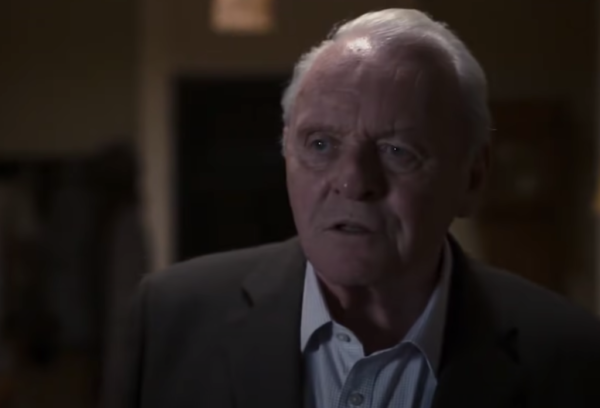The Father, a Moving Film about Alzheimer's Disease

Anthony Hopkins recently won the Oscar for Actor in a Leading Role for his performance in The Father. In fact, he’s the oldest actor in the history of cinema to win this award, at the age of 83. His impeccable performance basically made the film.
The Father is a front-row look at the reality of Alzheimer’s. Through Anthony’s eyes, the viewer enters a world whose perception fluctuates between disturbing and hostile. In addition, it’s also loving and endearing at times.
Furthermore, viewers witness the inexorable deterioration of senile dementia. They get to experience the overwhelming situation of the protagonist’s daughter, Anne (Olivia Colman). She exposes the dilemma of placing her father in a nursing home.
The Father, different characters, same scenario
The various characters work in the same scenario throughout the film. This is because it’s an adaptation of the play of the same name by director Florian Zeller. As he adapted it to film, the theatrical influence is noticeable throughout.
The props, such as the mirror and the doors were made just for the film. As the atmosphere of the setting is suffocating, the scenery plays an important role.
The film reveals how the main character’s consciousness is fading, and his personal objects and the place where he now lives are lost in the labyrinths of his memory. Generally, these memory losses come with a feeling of uneasiness and frustration.
In addition, the various characters in the film pose a challenge for Anthony, since they tell him personal information he doesn’t know. That his daughter is moving to Paris, for example. The film introduces these characters so that both the spectator and protagonist feel lost due to the disinformation. This produces a feeling of uneasiness.
Aphasia-apraxia-agnosia syndrome
The main character’s illness evolves and he shows Alzheimer’s disease through his own perception of the world.
He portrays the clinical part naturally, just as it manifests in reality. Here’s some information about this disease.
The prefix “a” in this syndrome means the absence of the function that follows it:
- Aphasia is the loss of the ability to produce or understand language, due to lesions in brain areas specialized in these functions. Mostly, people experience difficulties reading and writing.
- Apraxia is the difficulty performing purposeful movements. In the movie, the character has a hard time dressing himself.
- Finally, agnosia is the lack of knowledge about his identity and that of other people.
Generally, people lose autonomy due to the loss of awareness of their identity in the last phase of the disease. The film shows aphasia-apraxia-agnosia syndrome in this order and the last one [agnosia] is the most common expression of Alzheimer’s disease.

Implicit memory and explicit memory
- Explicit memory is that which includes conscious memories about events, places, people, or objects.
- Implicit or instrumental memory is that in which previous experiences help in the execution of tasks, such as habits, sensitization, classical conditioning, and perceptual and motor skills, such as riding a bicycle.
In general, the lead man loses his long-term memory, declarative memory (episodic memory, which refers to the loss of memory of past events, and early semantic memory). He may also experience procedural memory loss, which consists of the motor and executive skills necessary to perform a task.
The viewer can witness how the protagonist loses his explicit memory throughout the development of the plot, as he no longer remembers objects or places. Then, he loses the ability to remember his habits and skills.
Once he enters the agnosia stage, the man focuses on his daughter’s moral dilemma about what to do when he loses these basic abilities, such as his autonomy.
The Father reflects the contradictions, achievements, and setbacks of the struggle of the devastating clinical context of Alzheimer’s disease.
Perhaps the best part of the film is its honesty about the helplessness this disease causes.
All cited sources were thoroughly reviewed by our team to ensure their quality, reliability, currency, and validity. The bibliography of this article was considered reliable and of academic or scientific accuracy.
- Painepán, Beatriz, & Kühne, Walter. (2012). Sobrecarga, afrontamiento y salud en cuidadoras de pacientes con demencia tipo Alzheimer. Summa psicológica UST (En línea), 9(1), 5-14. Recuperado em 07 de maio de 2021, de http://pepsic.bvsalud.org/scielo.php?script=sci_arttext&pid=S0719-448×2012000100001&lng=pt&tlng=es.
This text is provided for informational purposes only and does not replace consultation with a professional. If in doubt, consult your specialist.








